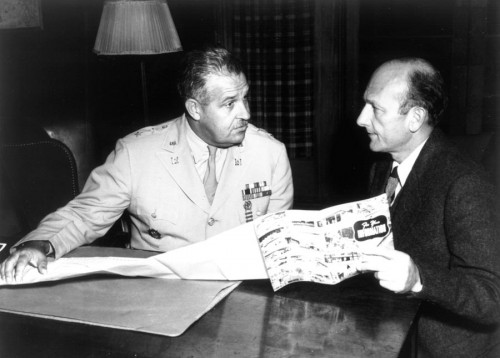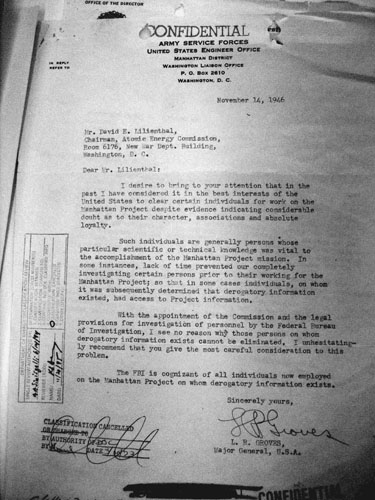It’s been a busy week. Yesterday I went to an interesting session hosted by the Atomic Heritage Foundation on the life and influence of Joseph Rotblat and the Pugwash movement. I learned some things I hadn’t known before. Of particular interest is that the common story about Rotblat leaving the Manhattan Project out of strong ethical convictions (he was supposedly the only person who left Los Alamos after the war in Europe had concluded without use of the bomb) is more complicated than it seems on the surface of it.
The story itself apparently wasn’t a matter of public record until Rotblat wrote an article about it for the Bulletin of the Atomic Scientists in 1985 (“Leaving the Bomb Project“), which is a lot more recent than I had guessed. Andrew Brown, whose book Keeper of the Nuclear Conscience: The Life and Work of Joseph Rotblat has just recently come out (I haven’t read it yet, but I bought a copy there), notes that Rotblat himself initially put a heavy caveat on the story: “All extraneous personal elements are left out, but their exclusion does not mean that they are unimportant.”
These “personal elements,” Brown argues, include things like the fact that Rotblat’s wife and family were stuck in Nazi and Soviet-occupied Poland, and that Rotblat, though a member of the British delegation to Los Alamos, had refused to take on either British or American nationality. This factor was overlook-able by General Groves at the explicit intervention by James Chadwick, the head of the British mission to Los Alamos, but not until Groves himself had personally interviewed Rotblat. Why would Groves care? Because he didn’t want Manhattan Project participants diffusing their bomb-making information all over the planet after the war was ended.
Why all this matters is that in fact, Brown argues, Rotblat didn’t simply leave the project… he was actually pushed out. The reasons are part of complex Manhattan Project diplomatic history: Groves had, with the insistence of the British, allowed a number of French scientists to join the project. (He compartmentalized them in Canada and didn’t give them access to US data, but still.) When the war in Europe ended the Nazis had been pushed out of France, 1 they wanted to return to Paris and to see their old boss, Frédéric Joliot-Curie, who was by then a known Communist. Groves was pretty uncomfortable with this and it created quite a diplomatic row between the US and the UK; 2 it was thus in Chadwick’s interests to simplify the situation by removing all non-Brits from the British delegation, which included Rotblat (who was, again, still a Polish citizen).
In any case, Brown points out, Rotblat didn’t totally get out of the nuclear business for a number of years; he continued to teach nuclear physics to people whom he knew would be working on the UK atomic program for a number of years after the war ended, before he started his real, devoted activism.
None of this diminishes Rotblat’s work or his obvious deep ethical convictions — he was clearly deeply opposed to war and worked tirelessly on disarmament issues for most of his life — but it does make a too-perfect story seem a bit more realistic. (Stan Norris was there, and asked whether Brown believed that Groves really did, as Rotblat claimed, announce that he had always thought the USSR was the key target. Brown thought it not implausible. I don’t find it too implausible, myself, given that it would have been pretty natural for the US to be looking to the USSR as its “natural” enemy after the war was ending, but it does have an element of being “too perfect” to it.)

General Groves (left) and David Lilienthal (right) share a moment. I imagine that most of their interactions looked like this, private or public. Photo by Ed Westcott.
My other busy-ness has been pulling together a presentation I’m giving at the Policy History Conference in Richmond, Virginia, on Thursday, relating to the early classification policies (and the failure of classification reform) during the David Lilienthal years at the U.S. Atomic Energy Commission (AEC), 1947-1950. I don’t want to go into details on here, but the paper is basically about the fact that numerous times in the first (and most ambitious) years of the AEC, the technocratic liberals who were running it attempted to re-think and re-work US nuclear classification policy from the ground up. It didn’t work, for a variety of reasons, the most damning of these being the series of shocks of late 1949 and early 1950 (Joe-1, the H-bomb debate, Klaus Fuchs).
The document I want to share this week is somewhat tangentially related to both of these issues. It is a letter from General Leslie Groves to David Lilienthal from November 1946, which was just on the cusp of the Manhattan Project’s transfer of all atomic responsibilities to the newly-created Atomic Energy Commission. 3
It’s a short letter; so here’s the transcription:
Dear Mr. Lilienthal:
I desire to bring to your attention that in the past I have considered it in the best interests of the United States to clear certain individuals for work on the Manhattan Project despite evidence indicating considerable doubt as to their character, associations, and absolute loyalty.
Such individuals are generally persons whose particular scientific or technical knowledge was vital to the accomplishment of the Manhattan Project mission. In some instances, lack of time prevented our completely investigating certain persons prior to their working for the Manhattan Project; so that in some cases individuals, on whom it was subsequently determined that derogatory information existed, had access to Project information.
With the appointment of the Commission and the legal provisions for investigation of personnel by the Federal Bureau of Investigation, I see no reason why those people on whom derogatory information exists cannot be eliminated. I unhesitatingly recommend that you give the most careful consideration to this problem.
The FBI is cognizant of all individuals now employed on the Manhattan Project on whom derogatory information exists.
Sincerely yours,
(signed)
L.R. Groves
Major General, U.S.A.
Quite a curious sort of thing to send and receive. Imagine being in Lilienthal’s position: here’s General Groves, handing off the bomb project to you, saying, “by the way, I hired a bunch of people who I now want to tell you might not be loyal. You might want to get rid of them. Anyway, I completely agree you should think about this pickle you’re now in. Good luck!”
Who were these “doubts”? Probably people like Leo Szilard, Frank Oppenheimer, and Philip Morrison. It may even have included Arthur Compton, who was always “on the line” for the security people (Compton wasn’t very discreet and signed too many petitions). It probably would have included Joseph Rotblat if he was still on the project (but as we know, he left). It did not, apparently, include J. Robert Oppenheimer, though the letter did re-surface at his security hearing.
Lilienthal wrote back to Groves noting that since Groves had kept a lot of these people on well beyond Hiroshima and Nagasaki, that Groves apparently did not regard them as “a source of critical hazard.” Groves then wrote back to Lilienthal saying that actually they couldn’t just be fired and removal was a slow process, so their presence didn’t imply anything about how non-hazardous they were. 4
What’s going on here, plainly, is an elaborate game of CYA — Groves is trying to imply that if these “doubts” became a problem, they were passed off to the AEC and shouldn’t hang on his head. Lilienthal, shrewdly, tries to turn it around to make sure that they do, in fact, hang on Groves’ head — he isn’t willing to just take all of the responsibility here if they are kept on, and he doesn’t also just want to do whatever Groves is implying he ought to do. Groves, in turn, was trying to deflect some of that themselves. They’re creating a paper trail — one that was, indeed, later followed up. 5
I find this sort of bureaucratic activity fascinating. It’s not the sort of thing that gets into the grand narratives of history — either the Groves-Lilienthal exchange, or the diplomatic flareup that (apparently) led to Rotblat leaving the Manhattan Project. It’s this sort of thing that gets washed away by straightforward, coherent narratives, replaced with stories of high ethics and morality, when so much of what went on from day-to-day was much more down to Earth in its considerations. This is one of the reasons I prefer working with archival materials more than secondary sources, personally; not because I don’t trust the scholarship (I generally do) or that I don’t get something out of it (ditto), but because I never feel I really understand what’s going on until I’ve gone through all of the bureaucratic and minor miscellany myself, unearthing the mundane.
- I hadn’t checked my dates before writing this; the “French problem” surfaced in December 1944, when the war in Europe was still going on, but the Nazis were no longer occupying France. Rotblat left the project that December as well, for England.[↩]
- I discuss this “French Problem,” as it was called at the time, in my “Patenting the Bomb” article, because a large part of the dispute centered around promises the British had made the French regarding early French patents on nuclear reactors and bombs.[↩]
- Citation: Leslie R. Groves to David E. Lilienthal (14 November 1946), Records of the Atomic Energy Commission, RG 326, National Archives and Records Administration, College Park, Maryland, Office of Secretary, General Correspondence 1946-1951, Box 11, “Security Clearance of Personnel, Volume 1.”[↩]
- The back-and-forth is contained in the Oppenheimer security hearing, page 169.[↩]
- When asked about this in the Oppenheimer hearing, Groves was pretty straightforward about it:
If I put it in writing, that they would always be thinking about the record. That is the reason that the letter was written. I have never made a practice of trying to protect myself on the record, but I thought this was one time that I could secure action, and it was not written really with the idea of clearing my skirts for something that might come up, such as this, many years hence. It was to make him do it whether he wanted to do it or not.
It’s also clear that this was born out of the difficult relationship between Groves and Lilienthal. “Mr. Lilienthal had made it very plain that he wanted no advice of any kind from me. He wanted nothing whatsoever to do with me. He thought that I was the lowest kind of human being, and he was not going to get anything from me.” Oppenheimer hearings, page 169.[↩]




That’s great. I copied the same correspondence between Lilienthal and Groves when I was going through AEC boxes at NARA.
There’s another aspect to the CYA going on here. Groves and the FBI clashed during the war years on issues of ultimate authority over security matters, a situation in which Groves pretty much prevailed over Hoover. The end of the war, the shift pending from military to civilian control under the AEC, and Hoover’s famous penchant for “always getting his man” were likely all weighing on Groves when he passed this hot potato to Lilienthal.
My guess is that Groves strongly suspected issues would be raised about those he referred to in his letter once the FBI became the investigating authority. As those familiar with the Oppenheimer purge know, Groves himself almost ended up in the line of fire. Good thing he was on record as briefing his successor, instead of simply walking away from things that could be used against him later. CYA indeed, but par for the course for Groves, a master navigator of the pre-Cold War national security bureaucracy.
Alex,
In Rotblat’s article in the Bulletin he says that in March 1944 he experienced a “disagreeable shock.” We know from Groves’ appointment book that Rotblat visited Groves office in DC at 8:30 am on February 25, 1944. He was brought there by Dr. W.L. Webster of the British Central Scientific Office in Washington who was responsible for processing members of the British Mission into the Manhattan Project. Groves crossed swords with Webster over background security checks of certain members. (see Racing for the Bomb, p. 330). Webster also brought H.W.B. Skinner with him who was another member of the British Mission. The interview did not last long as Groves made a call to a subordinate in New York at 8:45 am and had another visitor at 9:30 am.
In the days that followed Rotblat made his way to Los Alamos and initially stayed with the Chadwicks before moving to the “Big House.” So he had been at Los Alamos for less than a month when the “disageeable shock” took place.
In 1944 Groves made nine visits to Los Alamos. The March visits were March 1-3 and March 25-29. The later one is the more likely one when the dinner took place. So let’s assume that at the end of March Rotblat hears Groves say that the real purpose of the bomb is to “subdue the Soviets.” The fact is that he did not leave the Project for another eight months until December 1944. By this point it is clear that the Germans do not have a bomb as the Alsos team had found conclusive proof. Groves was finally convinced at the end of November/beginning of December 1944 but it is unclear how soon and how widely the scientists knew about this. Groves tried to limit it to keep them working though Goudsmit probably conveyed information when he got back. So when did Rotblat learn that there was no serious German bomb program?
So while it may have been a “shock” it took a while for Rotblat to act on it.
Two quotes, from Joseph Rotblat, answer Stan Norris’s specific question about when Rotblat learned there was no serious German program:
“JR: I was in Los Alamos for less than a year. Well, I came in the beginning of 1944, and left by the end of 1944. As soon as I came to Los Alamos, I realised that my fear about the Germans making the bomb was ungrounded, because I could see the enormous effort which was required by the American(s), with all their resources practically intact, intact by the war – everything that you wanted was put into the effort. Even so, I could see that it’s still far away, and that by that time the war in Europe was showing that Hitler is going to be defeated, and I could see that probably the bomb won’t be ready; even that Hitler wouldn’t have it in any case. Therefore I could see this from the beginning, that my being there, in the light of the reason why I came to work on it, was not really justified. But nevertheless, I could not be sure that the Germans would not find a shortcut maybe and they could still make the bomb. Therefore I kept on working together with the other people, although I was very unhappy about having to work on it. But as soon as I learned, towards the end of 1944, that the Germans have abandoned the project, in fact a long time before, I decided that my presence there was no longer justified, and I resigned and I went back to England. (Joseph Rotblat, November 15, 1998, National Security Archive Interview, http://www.gwu.edu/~nsarchiv/coldwar/interviews/episode-8/rotblat1.html)
Second quote:
“In late 1944…Chadwick told me that an intelligence report indicated that the Germans weren’t working on the bomb. A few days later I told him I wanted to leave.” Joseph Rotblat quoted in, Susan Landau, “Joseph Rotblat: The Road Less Traveled,” Bulletin of the Atomic Scientists, Jan/Feb 1996.
Thank you Sandra.
So what role did Groves’ statement have in causing Rotblat to leave? Finding out about the stillborn German prgram at the end of 1944 seems a stronger candidate, as he acknowledges.
[…] of course, ignores the question of “so why did you continue when the Germans were known not to have made much progress?” and much […]